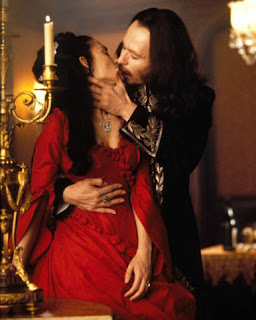The commercialism of Valentine’s Day means it’s always full of some pretty big clichés: hearts, flowers, sickly sweet chocolate. Romantic relationships in books and movies are often no exception and can sometimes feel predictable and formulaic. So for this Valentine’s Day post I’m going to look at some depictions of love in books that are not your run-of-the-mills-and-boon romances, and some examples of love that are not at all romantic.
1. Lucy Snow and M. Paul, Villette:
QUOTE: “Lucy, take my love. One day share my life. Be my dearest, first on earth.”
2. Ashima and Ashoke, The Namesake:
A story of a young Bengali couple who move
from India to America and build a life there. While this story centres around their
son Nikhil and his life and choices, it’s the relationship of his parents that
I find the most touching. Ashima and
Ashoke have had a traditional, arranged marriage, but there is tenderness,
devotion and respect in their marriage, which seems to be lacking in Nikhil’s
own relationships and subsequent marriage. There is a lot in their relationship
that I recognise from the marriages of my own older relatives, parents and
grandparents. I love that Lahiri portrays the relationship of an older couple
so positively, and that she offers an alternative view to Western or Hollywood
notions of romance, love and marriage.
QUOTE: “It’s not
the type of thing Bengali wives do. Like a kiss or caress in a Hindi movie, a
husband’s name is something intimate and therefore unspoken, cleverly patched
over. And so, instead of saying Ashoke’s name, she utters the interrogative
that has come to replace it, which translates roughly as “Are you listening to
me?”
3. The Count and all his victims, Dracula:
Not love here so much as lust or some other
sort of physical attraction, although some filmmakers have drawn out threads
that hint of love. Dracula does say at one point, “I too can love.” However the
vampires also wield a kind of power of attraction throughout the novel. In fact
it’s quite hard NOT to pick up on the erotic undertones. The descriptions of
Dracula and his other undead brides are distinctly sensual – all red lips and
licking tongues - and the victims are frequently portrayed as anticipating,
even longing for, the ultimate encounter.
QUOTE: "The fair
girl went on her knees and bent over me, fairly gloating. There was a
deliberate voluptuousness which was both thrilling and repulsive, and as she
arched her neck she actually licked her lips like an animal... I could feel the
soft, shivering touch of the lips on the super-sensitive skin of my throat, and
the hard dents of two sharp teeth, just touching and pausing there. I closed my
eyes in a languorous ecstasy and waited – waited with a beating heart."
4. Katniss and Peeta, The Hunger Games:
Definitely not a “romance novel” in the way
that, say, Twilight is, but in and amongst all the violence and slaughter,
there is a beautiful relationship that develops between Katniss and Peeta.
While Gale is the obvious choice for Katniss – best friend and hunting buddy, a
fighter in the same way that Katniss is, and he obviously has feelings for her
– it’s Peeta who is her real partner. Peeta has a quiet strength; he is gentle
at heart without being a coward, and offers her comfort and stability; he has
the emotional maturity that is lacking in Gale. However their friendship doesn’t
grow organically like Katniss and Gale’s. Katniss and Peeta’s relationship is
forced by circumstances over which they have no control. They have to maintain
a “star-crossed lovers” narrative for the viewers watching the Games – their
lives and the lives of their families depend on maintaining the charade. But at
some point it stops being pretence and becomes real, and Suzanne Collins
explores how going through trauma with someone can draw people closer together.
QUOTE: “And while I was
talking, the idea of actually losing Peeta hit me again and I realized how much
I don't want him to die. And it's not about the sponsors. And it's not about
what will happen when we get home. And it's not just that I don't want to be
alone. It's him. I do not want to lose the boy with the bread.”
5. Sam and Frodo, Lord of The Rings
It might not be romantic, but there’s no denying
the strength of love that Sam and Frodo have for each other. Sam practically
followed Frodo into the mouth of hell. They save each other’s lives, which must
have deepened their bond, similar to the way in which Katniss and Peeta’s bond
is strengthened through their shared experiences. Tolkien’s war experiences
informed his depiction of the comradeship and love between men thrown into the
horrors of war, and The Lord Of The Rings is very much about the friendship
between people collectively facing danger.
QUOTE: "But I am
going to Mordor."
"I know that well enough, Mr. Frodo. Of course you are. And I'm coming with you.
"I know that well enough, Mr. Frodo. Of course you are. And I'm coming with you.
6. The Creature, Frankenstein
Like Dracula, this is often thought of as a
Victorian gothic tale, and Hollywood has turned it into a kind of horror
staple. It’s actually a desperately sad story about a creature that just wants
to be loved and his rejection by the world, which fuels his anguish and rage.
It is not necessarily concerned with romantic love - this is a story about the
effects of living without love or companionship of any kind. How can you not
shed a tear for the poor Creature?
QUOTE: “I was
benevolent; my soul glowed with love and humanity: but am I not alone,
miserably alone?”
Thanks for reading! Which unlikely love stories do you recommend?






Comments
Post a Comment